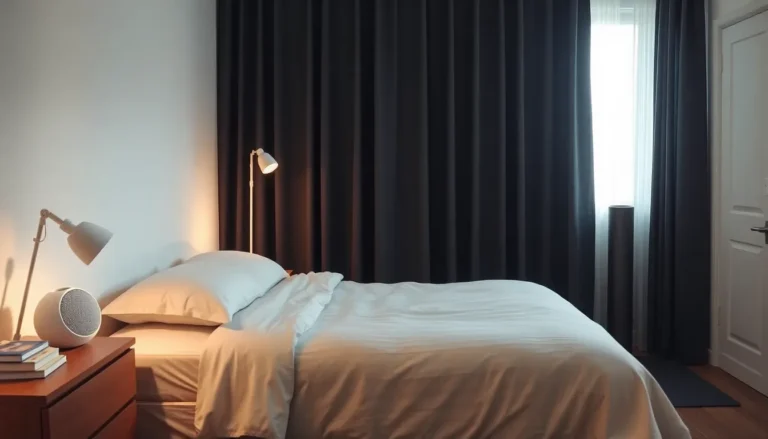Buying a home is one of the biggest financial decisions most people will ever make. Yet many buyers underestimate the power of negotiation when it comes to house prices. Understanding how to negotiate effectively can save thousands of dollars and lead to a more satisfying purchase experience.
In today’s competitive real estate market, knowing the right strategies can make all the difference. Whether it’s understanding market trends or leveraging inspection reports, skilled negotiators can navigate the complexities of home buying with confidence. This article explores essential tips and techniques to help buyers secure the best possible price for their dream home.
Table of Contents
ToggleUnderstanding Negotiating House Price
Negotiating house prices plays a vital role in the home buying process. Buyers who grasp negotiation strategies often secure better deals, enhancing their overall purchasing experience.
Importance of Negotiation in Real Estate
Negotiation significantly impacts the final purchase price of a home. Buyers who negotiate effectively can save thousands of dollars. Research shows that homes often sell below their listed prices, with average negotiation savings ranging from 1% to 5%. Understanding local market conditions and trends equips buyers to advocate for a fair price. Negotiation also extends beyond price. Buyers can negotiate terms such as closing dates or contingencies, creating a more favorable transaction overall.
Common Misconceptions About House Pricing
Many buyers hold misconceptions about house pricing that can hinder their negotiation efforts. Common beliefs include assuming the listing price reflects the true market value or thinking sellers won’t budge on their price. In reality, most sellers expect negotiations and may set initial prices above market value to leave room for bargaining. Another misconception involves ignoring market data; understanding recent sales in the area often proves essential to making informed offers. Recognizing these misconceptions empowers buyers to negotiate confidently, streamlining the home buying process.
Preparing for Negotiation

Preparation plays a crucial role in successful house price negotiation. Buyers who equip themselves with the right information and insights can negotiate effectively and confidently.
Researching the Market Value
Researching market value involves analyzing recent home sales and understanding local trends. Buyers should:
- Gather data: Look for comparable home sales, or “comps,” within a one-mile radius. Focus on properties with similar features, such as size, age, and condition, to establish a baseline.
- Analyze the market: Identify whether it’s a buyer’s or seller’s market. High demand and low inventory can inflate prices, while an oversupply may push them down.
- Consult professionals: Engage with real estate agents or appraisers who can provide current valuation insights and guidance on pricing strategies.
- Utilize online tools: Platforms like Zillow and Redfin offer estimates and historical price trends that aid in understanding neighborhood values.
Assessing Your Financial Position
Assessing financial position equips buyers with a clear understanding of their purchasing power. Buyers should:
- Evaluate budget limits: Determine a realistic price range based on income, expenses, and savings, ensuring affordability for additional costs like taxes and maintenance.
- Secure financing: Obtain a pre-approval letter from lenders, which enhances credibility and clarifies budget constraints.
- Factor in extra expenses: Consider closing costs, home inspections, and potential renovations that could affect overall affordability.
- Analyze long-term financial stability: Assess job security, potential income changes, and future financial goals to ensure sustainability beyond the initial purchase.
This preparation sets the groundwork for effective negotiation, empowering buyers to advocate confidently for the best possible price.
Strategies for Effective Negotiation
Effective negotiation strategies enhance the buyer’s ability to secure a favorable house price. Utilizing specific tactics can foster positive interactions and minimize potential pitfalls in the negotiation process.
Building Rapport with the Seller
Building rapport with the seller establishes trust and can influence their willingness to negotiate. Approaching the conversation with empathy creates a connection, making it easier to discuss terms. Buyers should:
- Express genuine interest in the property to show appreciation for the seller’s home.
- Share personal stories that relate to the home or neighborhood, creating emotional ties.
- Remain respectful during discussions, acknowledging the seller’s position and offering constructive feedback on any concerns.
- Engage in active listening to understand the seller’s motivations, which may reveal areas for potential compromise.
Approaching negotiations with a collaborative spirit can lead to a more favorable outcome.
Knowing When to Walk Away
Recognizing the right moment to walk away preserves the buyer’s interests and limits excessive financial strain. Buyers should consider walking away if:
- Initial offers are significantly lower than the seller’s asking price, indicating a disconnect in valuation.
- After multiple rounds of negotiation, no acceptable progress occurs, suggesting the seller’s unwillingness to compromise.
- Property inspections reveal major issues that affect the home’s value and the seller refuses to negotiate repairs.
- Budget constraints present challenges that make achieving a satisfactory price unfeasible.
Understanding these thresholds enables buyers to confidently protect their financial well-being and ensures they do not settle for unfavorable terms.
Closing the Deal
Closing the deal marks the final stage of house price negotiation. Buyers must navigate the intricacies of offers, counteroffers, and associated costs, ensuring each step aligns with their budget and objectives.
Finalizing Offers and Counteroffers
Finalizing offers involves carefully considering the initial proposal and any counteroffers. Buyers should present a strong initial offer based on market analysis and comparable properties. When responding to a counteroffer, buyers can:
- Increase their offer strategically within budget limits.
- Highlight any unique property features that justify a higher price.
- Maintain open communication with the seller to explore potential compromises.
Effective negotiation hinges on clarity and promptness in communication, emphasizing the buyer’s commitment while being mindful of their financial boundaries. Buyers focused on establishing rapport may better facilitate productive discussions and foster goodwill.
Understanding Closing Costs
Understanding closing costs is essential in the final negotiation phase. These costs typically range from 2% to 5% of the home’s purchase price and may include:
| Cost Type | Description |
|---|---|
| Loan origination fees | Charges from a lender for processing the loan. |
| Appraisal fees | Costs for assessing the property’s market value. |
| Title insurance | Protection against potential title defects or claims. |
| Escrow fees | Fees for managing the funds and documentation during closing. |
| Inspection fees | Costs for home inspections revealing property conditions. |
Buyers should factor these costs into their overall budget. Understanding these expenses empowers buyers to negotiate not just the house price but also to seek concessions on closing costs, thereby enhancing their financial position during the purchase.
Negotiating house prices is a vital skill that can significantly impact a buyer’s financial outcome. By employing effective strategies and understanding market dynamics, buyers can approach negotiations with confidence. Preparation is key; knowing one’s budget and the local market can empower buyers to advocate for themselves.
Building rapport with sellers and being ready to walk away when necessary can also lead to better deals. As buyers navigate the complexities of closing, awareness of all associated costs will further enhance their position. Ultimately, successful negotiation not only secures a fair price but also contributes to a more satisfying home buying experience.




